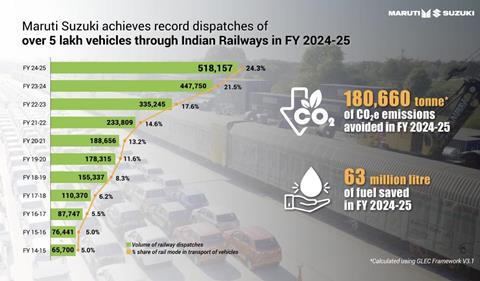Maruti Suzuki has once again increased the annual volume of vehicles distributed by rail across India, equal to almost 25% of its total outbound volume across the financial year.
Indian carmaker Maruti Suzuki has reported moving more than 500,000 vehicles by rail in the last financial year (2024-2025), roughly a quarter of its total distribution across the period (see chart). The carmaker said that in doing so it saved 180,000 tonnes of CO2 emissions and 630m litres of fuel.

Maruti Suzuki said that it dispatches vehicles to more than 20 hubs using rail, from where over 600 cities across India are served. It also uses rail to move vehicles to the ports of Mundra and Pipavav for export.
The company currently uses 40 flexible deck auto rakes, each with a capacity for around 300 vehicles per journey.
“Reducing carbon emissions is a top priority for us, both in our products and in our operations,” said Hisashi Takeuchi, managing director and CEO of Maruti Suzuki India. “Maruti Suzuki was the first company in India to obtain an Automobile Freight Train Operator [Afto] licence, in 2013. Since then, we have dispatched nearly 24 lakh [2.4m] vehicles through [the] rail mode. By FY 2030-31, we plan to increase the share of vehicle dispatches through railways to 35%.”

The Afto licence enables Maruti Suzuki to operate high speed, high-capacity finished vehicle carrying wagon rakes on state-run Indian Railway’s network.
The carmaker reported that vehicles dispatched by rail have grown by nearly eight times. In 2024 it opened India’s first in-plant railway siding at the Gujurat assembly plant. The facility has annual capacity to dispatch 300,000 vehicles by rail to 15 destinations across India. It is the result of a collaboration between Maruti Suzuki India and Gujarat Rail Infrastructure Development (G-Ride), a Government of Gujarat and Indian Railways partnership, along with Gujarat Industrial Development Corporation (GIDC).
The carmaker is also now working on an in-plant railway siding at its Manesar plant, which it said will be operational soon. Earlier this year Maruti Suzuki opened an additional assembly line at its Manesar plant complex, with annual capacity to make 100,000 units, bringing total manufacturing capability at Manesar to 900,000 vehicles per year.







































No comments yet